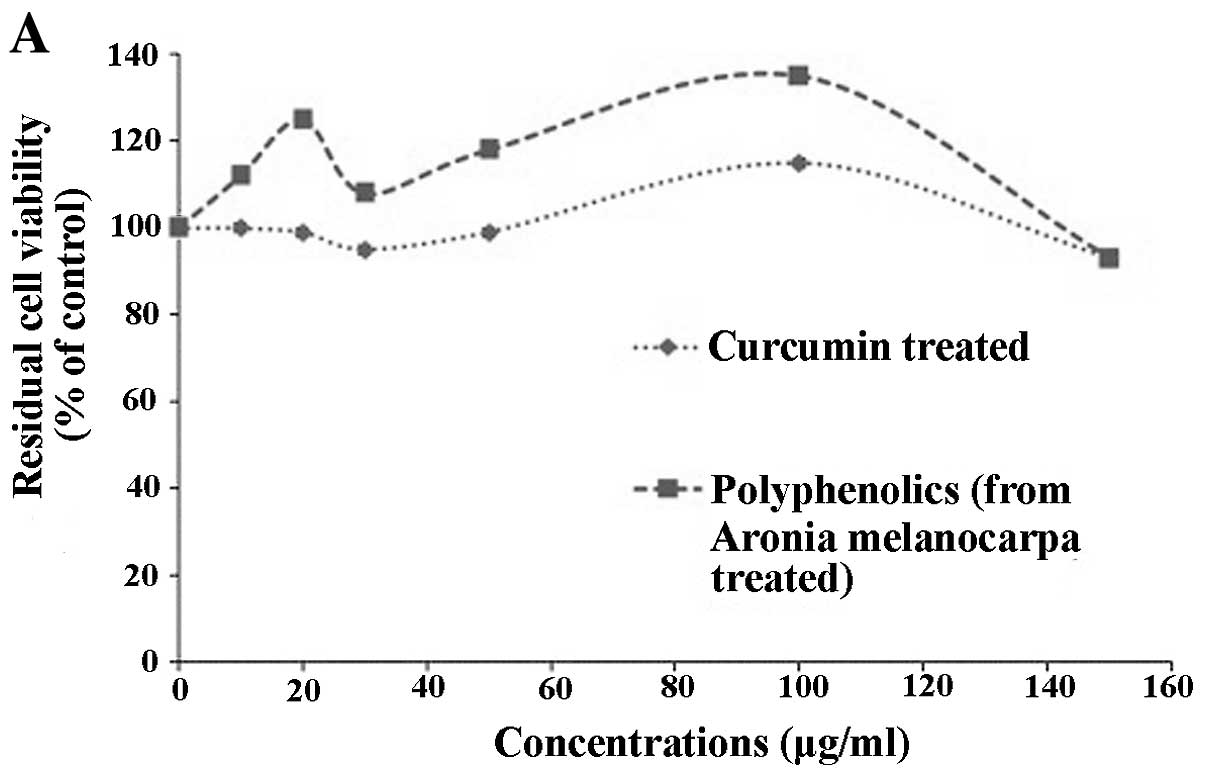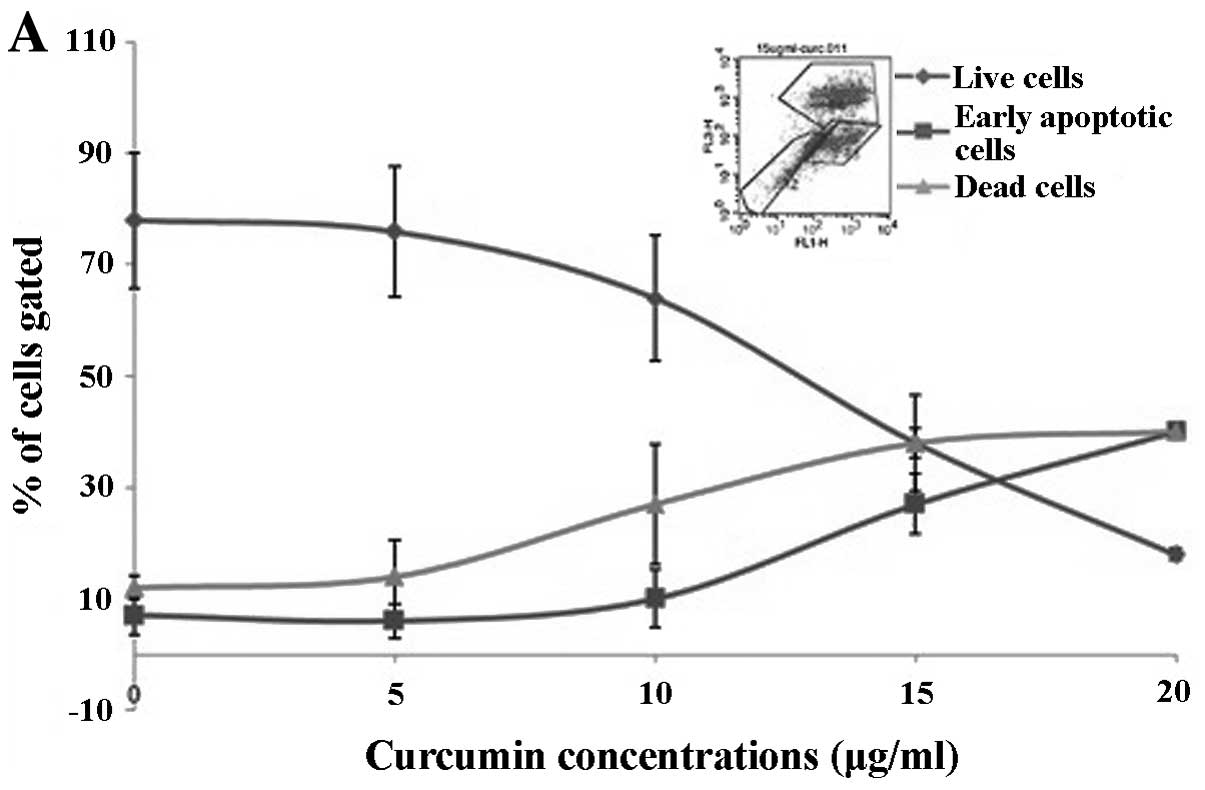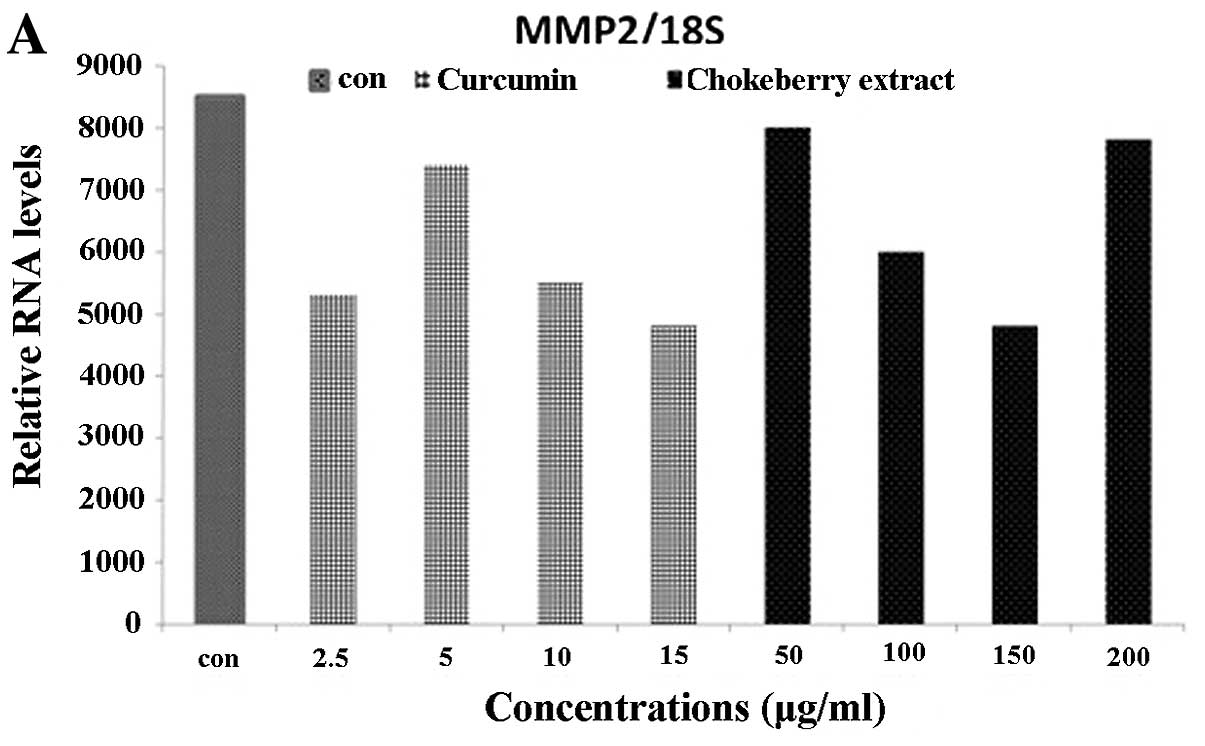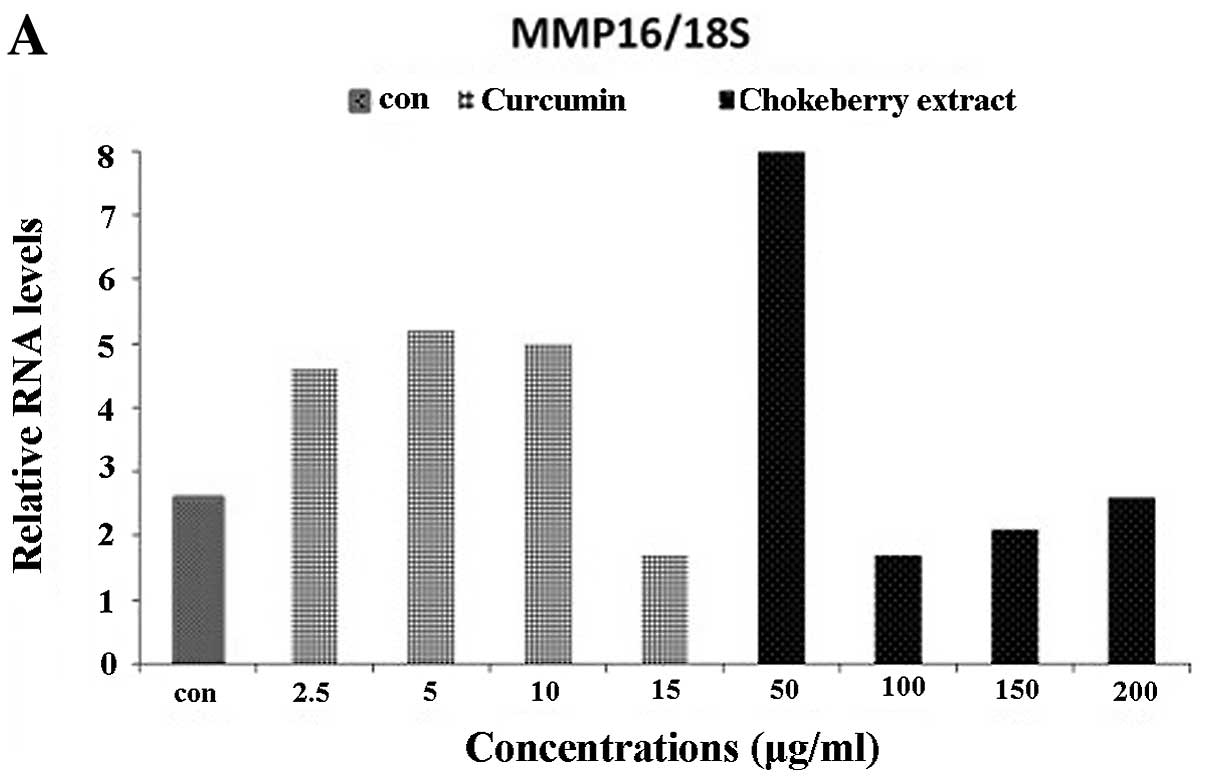|
1
|
McKinney PA: Brain tumours: incidence,
survival and aetiology. J Neurol Neurosurg Psychiatry. 75:1–12.
2004. View Article : Google Scholar : PubMed/NCBI
|
|
2
|
Egelblad M and Werb Z: New functions for
the matrix metalloproteinases in cancer progression. Nature Rev.
2:161–174. 2002.PubMed/NCBI
|
|
3
|
Bourboulia D and Stetler-Stevenson WG:
Matrix metalloproteinases (MMPs) and tissue inhibitors of
metalloproteinases (TIMPs): positive and negative regulators in
tumor cell adhesion. Semin Cancer Biol. 20:161–168. 2010.
View Article : Google Scholar : PubMed/NCBI
|
|
4
|
Cauwe B, Van den Steen PE and Opdenakker
G: The biochemical, biological, and pathological kaleidoscope of
cell surface substrates processed by matrix metalloproteinases.
Crit Rev Biochem Mol Biol. 42:113–185. 2007. View Article : Google Scholar : PubMed/NCBI
|
|
5
|
Nuttal RK, Pennington CJ, Taplin J, Wheal
A, Yong VW, Forsyth PA and Edwards DR: Elevated membrane-type
matrix metalloproteinases in gliomas revealed by profiling
proteases and inhibitors in human cancer cells. Mol Cancer Res.
1:333–345. 2003.PubMed/NCBI
|
|
6
|
Gomez DE, Alonso DF, Yoshiji H and
Thorgeirsson UP: Tissue inhibitors of metalloproteinases:
structure, regulation and biological functions. Eur J Cell Biol.
74:111–122. 1997.PubMed/NCBI
|
|
7
|
Skrzydlewska E, Sulkowska M, Koda M and
Sulkowski S: Proteolytic-antiproteolytic balance and its regulation
in carcinogenesis. World J Gastroenterol. 11:1251–1266. 2005.
View Article : Google Scholar : PubMed/NCBI
|
|
8
|
Baker AH, Edwards DR and Murphy G:
Metalloproteinase inhibitors: biological actions and therapeutic
opportunities. J Cell Sci. 115:3719–3727. 2002. View Article : Google Scholar : PubMed/NCBI
|
|
9
|
Stupp R, Tonn JC, Brada M and
Pentheroudakis G: High-grade malignant glioma: ESMO clinical
practice guidelines for diagnosis, treatment and follow-up. Ann
Oncol. 21:V190–V193. 2010. View Article : Google Scholar : PubMed/NCBI
|
|
10
|
Westphal M, Hilt DC, Bortey E, Delavault
P, Olivares R, Warnke PC, Whittle IR, Jaaskelainen J and Ram Z: A
phase 3 trial of local chemotherapy with biodegradable carmustine
(BCNU) wafers (Gliadel wafers) in patients with primary malignant
glioma. Neuro Oncol. 5:79–88. 2003.PubMed/NCBI
|
|
11
|
Weber EL and Goebel EA: Cerebral edema
associated with gliadel wafers: two case studies. Neuro Oncol.
7:84–89. 2005. View Article : Google Scholar : PubMed/NCBI
|
|
12
|
Tapiero H, Tew KD, Nguyen Ba G and Mathe
G: Polyphenols: do they play a role in the prevention of human
pathologies? Biomed Pharmacother. 56:200–207. 2002. View Article : Google Scholar : PubMed/NCBI
|
|
13
|
Rooprai HK, Kandanearatchi A, Maidment SL,
Christidou M, Trillo-Pazos G, Dexter DT, Rucklidge GJ, Widmer W and
Pilkington GJ: Evaluation of the effects of swainsonine, captopril,
tangeretin and nobiletin on the biological behaviour of brain
tumour cells in vitro. Neuropathol Appl Neurobiol. 27:29–39. 2001.
View Article : Google Scholar : PubMed/NCBI
|
|
14
|
Rooprai HK, Christidou M and Pilkington
GJ: The potential for strategies using micronutrients and
heterocyclic drugs to treat invasive gliomas. Acta Neurochir
(Wien). 145:683–690. 2003. View Article : Google Scholar : PubMed/NCBI
|
|
15
|
Aggarwal BB, Kumar A and Bharti AC:
Anticancer potential of curcumin: preclinical and clinical studies.
Anticancer Res. 23:363–398. 2003.PubMed/NCBI
|
|
16
|
Sharma RA, Gescher AJ and Steward WP:
Curcumin: the story so far. Eur J Cancer. 41:1955–1968. 2005.
View Article : Google Scholar : PubMed/NCBI
|
|
17
|
Datla KP, Zbarsky V and Dexter D: Effects
of anaesthetics on the loss of nigrostriatal dopaminergic neurons
by 6-hydroxydopamine in rats. J Neural Transm. 113:583–591. 2006.
View Article : Google Scholar : PubMed/NCBI
|
|
18
|
Pillai GR, Srivastava AS, Hassanein TI,
Chauhan DP and Carrier E: Induction of apoptosis in human lung
cancer cells by curcumin. Cancer Lett. 208:163–170. 2004.
View Article : Google Scholar : PubMed/NCBI
|
|
19
|
Simon A, Allais DP, Durox JL, Basly JP,
Durand-Fontainer S and Delage C: Inhibitory effect of curcuminoids
on MCF-7 cell proliferation and structure-activity relationships.
Cancer Lett. 129:111–116. 1998. View Article : Google Scholar : PubMed/NCBI
|
|
20
|
Shi M, Cai Q, Yao L, Mao Y, Ming Y and
Ouyang G: Antiproliferation and apoptosis induced by curcumin in
human ovarian cancer cells. Cell Biol Int. 30:221–226. 2006.
View Article : Google Scholar : PubMed/NCBI
|
|
21
|
Anand P, Sundaram C, Jhurani S,
Kunnumakkara AB and Aggarwal BB: Curcumin and cancer: an ‘old-age’
disease with an ‘age-old’ solution. Cancer Lett. 267:133–164.
2008.
|
|
22
|
Duvoix A, Roman B, Delhalle S,
Schnekenburger M, Morceau F, Henry E, Dicato M and Diederich M:
Chemopreventive and therapeutic effects of curcumin. Cancer Lett.
223:181–190. 2005. View Article : Google Scholar : PubMed/NCBI
|
|
23
|
Anto RJ, Mukhopadhyay A, Dening K and
Aggarwal BB: Curcumin (diferuloylmethane) induces apoptosis through
activation of caspase-8, BID cleavage and cytochrome c release: its
suppression by ectopic expression of Bcl-2 and Bcl-xl.
Carcinogenesis. 23:143–150. 2002. View Article : Google Scholar : PubMed/NCBI
|
|
24
|
Larsen CA, Bisson WH and Dashwood RH: Tea
catechins inhibit hepatocyte growth factor receptor (MET kinase)
activity in human colon cancer cells: kinetic and molecular docking
studies. J Med Chem. 52:6543–6545. 2009. View Article : Google Scholar
|
|
25
|
Malik M, Zhao C, Schoene N, Guisti MM,
Moyer MP and Magnuson BA: Anthocyanin-rich extract from Aronia
meloncarpa E induces a cell cycle block in colon cancer but not
normal colonic cells. Nutr Cancer. 46:186–196. 2003.
|
|
26
|
Zhao C, Giusti MM, Malik M, Moyer MP and
Magnuson BA: Effects of commercial anthocyanin-rich extracts on
colonic cancer and nontumorigenic colonic cell growth. J Agric Food
Chem. 52:6122–6128. 2004. View Article : Google Scholar : PubMed/NCBI
|
|
27
|
Andress-Lacueva C, Shukitt-Hale B, Galli
RL, Jaurengui O, Lamuela-Raventos RM and Joseph JA: Anthocyanins in
aged blueberry-fed rats are found centrally and may enhance memory.
Nutr Neurosci. 8:111–120. 2005. View Article : Google Scholar : PubMed/NCBI
|
|
28
|
Nikkah G, Tonn JC, Hoffmann O, Kraemer HP,
Darling JL, Schahenmayr W and Schonmayr R: The MTT assay for
chemosensitivity testing of human tumours of the central nervous
system. J Neurooncol. 13:13–24. 1992. View Article : Google Scholar : PubMed/NCBI
|
|
29
|
Pennington CJ and Edwards DR: Real time
PCR expression profiling of MMPs and TIMPs. Matrix
Metalloproteinase Protocols. Methods Mol Biol. 622:159–173. 2010.
View Article : Google Scholar : PubMed/NCBI
|
|
30
|
Vermes I, Haanen C, Steffens-Nakken H and
Reutelingsperger C: A novel assay for apoptosis. Flow cytometric
detection of phosphatidylserine expression on early apoptotic cells
using fluorescein labelled Annexin V. J Immunol Methods. 184:29–51.
1995. View Article : Google Scholar
|
|
31
|
Anand P, Kunnumakkara AB, Newman RA and
Aggarwal BB: Bioavailability of curcumin: problems and promises.
Mol Pharm. 4:807–818. 2007. View Article : Google Scholar : PubMed/NCBI
|
|
32
|
Zhang Y, Vareed SK and Nair MG: Human
tumor cell growth inhibition by nontoxic anthocyanidins, the
pigments in fruits and vegetables. Life Sci. 76:1465–1472. 2005.
View Article : Google Scholar : PubMed/NCBI
|
|
33
|
Inagaki A, Soeda A, Oka N, Kitajima H,
Nagakawa J, Motohashi T, Kunisada T and Iwama T: Long-term
maintenance of brain tumor stem cell properties under at
non-adherent and adherent culture conditions. Biochem Biophys Res
Commun. 361:586–592. 2007. View Article : Google Scholar : PubMed/NCBI
|
|
34
|
Szakacs G and Gottesman MM: Comparing
solid tumours with cell lines: implications for identifying drug
resistance genes in cancer. Mol Interv. 4:323–325. 2004. View Article : Google Scholar : PubMed/NCBI
|
|
35
|
Singh SK, Clarke ID, Terasaki M, et al:
Identification of a cancer stem cell in human brain tumors. Cancer
Res. 63:5821–5828. 2003.PubMed/NCBI
|
|
36
|
Galli R, Binda E, Orfanelli U, et al:
Isolation and characterization of tumorigenic, stem-like neural
precursors from human glioblastoma. Cancer Res. 64:7011–7021. 2004.
View Article : Google Scholar : PubMed/NCBI
|
|
37
|
Saha A, Kuzuhara T, Echigo N, et al:
Apoptosis of human lung cancer cells by curcumin mediated through
up-regulation of ‘growth arrest and DNA damage inducible genes 45
and 153’. Biol Pharm Bull. 33:1291–1299. 2010.
|
|
38
|
Bill MA, Fuchs JR, Li C, et al: Curcumin
induces proapoptotic effects against human melanoma cells and
modulates the cellular response to immunotherapeutic cytokines. Mol
Cancer Ther. 8:2726–2735. 2009. View Article : Google Scholar : PubMed/NCBI
|
|
39
|
Nakada M, Kita D, Futami K, Yamashita J,
Fujimoto N, Sato H and Okada Y: Roles of membrane type 1 matrix
metalloproteinases and tissue inhibitor of metalloproteinases 2 in
invasion and dissemination of human malignant glioma. J Neurosurg.
94:464–473. 2001. View Article : Google Scholar : PubMed/NCBI
|
|
40
|
Sekine-Aizawa Y, Hama E, Watanabe K,
Tsubuki S, Kanai-Azuma M, Kanai Y, Arai H, Aizawa H, Iwata N and
Saido TC: Matrix metalloproteinase (MMP) system in brain:
identification and characterization of brain-specific MMP highly
expressed in cerebellum. Eur J Neurosci. 13:935–948. 2001.
View Article : Google Scholar : PubMed/NCBI
|
|
41
|
Rooprai HK, Kyriazis I, Nuttall RK,
Edwards DR, Zicha D, Aubyn D, Davies D, Gullan R and Pilkington GJ:
Inhibition of invasion and induction of apoptosis by selenium in
human malignant brain tumour cells in vitro. Int J Oncol.
30:1263–1271. 2007.PubMed/NCBI
|


















